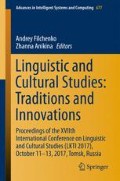Abstract
The article explores linguistic features of communication in massive open online courses (MOOCs), the possibilities of their usage in professionally oriented foreign language teaching at tertiary level. A number of linguistic features of various types of texts created by MOOCs participants are revealed, possibilities of this type of foreign language resources in teaching specific language are analyzed, the structure of foreign language competencies in professional and scientific spheres and foreign language competencies related to the usage of information and communication technologies (ICT) are determined.
Access this chapter
Tax calculation will be finalised at checkout
Purchases are for personal use only
References
Kop, R.: The challenges to connectivist learning on open online networks: learning experiences during a massive open online course. Int. Rev. Res. Open Distance Learn. 12(3), 20–38 (2011)
Onah, D., Sinclair, J., Boyatt, R.: Exploring the use of MOOC discussion forums. In: London International Conference on Education 2014, pp. 1–4. Infonomics Society, London (2014)
Yang, D., Piergallini, M., Howley, I., Rose, C.: Forum thread recommendation for massive open online courses. In: Stamper, J., Pardos, Z., Mavrikis, M., McLaren, B.M. (eds.) 7th International Conference on Educational Data Mining 2014, London. LNCS, pp. 257–260 (2014)
Sinha, T., Li N., Jermann, P., Dillenbourg, P.: Capturing “attrition intensifying” structural traits from didactic interaction sequences of MOOC learners. In: Conference on Empirical Methods in Natural Language Processing 2014, pp. 42–49. Taberg Media Group AB, Taberg (2014)
Wong, J., Pursel, B., Divinsky, A., Jansen, J.B.: An analysis of MOOC discussion forum interactions from the most active users. In: Social Computing, Behavioral-Cultural Modeling, and Prediction 2015, pp. 452–457. Springer, Heidelberg (2015)
Zhang, Q., Peck, K.L., Hristova, A., Jablokow, K.W., Hoffman, V., Park, E., Bayeck, R.Y.: Exploring the communication preferences of MOOC learners and the value of preference-based groups: is grouping enough? Educ. Tech. Res. Dev. 64, 1361 (2011)
Gillani, N., Eynon, R.: Communication patterns in massively open online courses. Internet High. Educ. 23, 18–26 (2014)
Tu, C.: From presentation to interaction: new goals for online learning technologies. Educ. Media Int. 3, 189–206 (2005)
Hogan, B.: The presentation of self in the age of social media: distinguishing performances and exhibitions online. Bull. Sci. Technol. Soc. 30(6), 377–386 (2010)
García-Peñalvo, F.J., Cruz-Benito, J., Borrás-Gené, O., Blanco, A.F.: Evolution of the conversation and knowledge acquisition in social networks related to a MOOC course. In: Panayiotis, Z., Andri, I. (eds.) Learning and Collaboration Technologies, pp. 470–481. Springer International Publishing, Cham (2015)
Yang, Q.: Students motivation in asynchronous online discussions with MOOC mode. Am. J. Educ. Res. 5, 325–330 (2014)
Joinson, A.N.: Self-disclosure in computer-mediated communication: the role of self-awareness and visual anonymity. Eur. J. Soc. Psychol. 31, 177–192 (2001)
Walther, J.B.: Selective self-presentation in computer-mediated communication: hyperpersonal dimensions of technology, language, and cognition. Comput. Hum. Behav. 23, 2538–2557 (2007)
Hammond, M.: A review of recent papers on online discussion in teaching and learning in higher education. J. Asynchronous Learn. 3, 9–23 (2005)
Gazifov, R.A.: Sposoby funkcionirovaniya implicitnoj vezhlivosti v ehkspressivnyh rechevyh aktah (na materiale nemeckoj lingvokul’tury) (in Russian) [Methods of functioning implicit politeness in expressive speech acts (on the basis of German linguistic culture)]. Vestnik CHelyabinskogo gosudarstvennogo universiteta 29(320), 24–26 (2013)
Shhipicina, L.J.: Zhanry komp’juterno-oposredovannoj kommunikacii: monografija (in Russian) [Genres of computer-mediated communication: monograph]. Pomorskij universitet, Arkhangelsk (2009)
Shhipicina, L.J.: Komp’juterno-oposredovannaja kommunikacija. Lingvisticheskij aspekt analiza (in Russian) [Computer-mediated communication. Linguistic Aspect of Analysis]. Krasand, Moscow (2010)
Goroshko, E.I., Polyakova, T.L.: Lingvisticheskie osobennosti angloyazychnogo tvittera (in Russian) [Linguistic features of Anglophone twitter]. Uchenye zapiski Tavricheskogo nacional’nogo universiteta im. V.I. Vernadskogo. Seriya «Filologiya. Social’nye kommunikacii» 24(63), 53–58 (2011)
Author information
Authors and Affiliations
Corresponding author
Editor information
Editors and Affiliations
Rights and permissions
Copyright information
© 2018 Springer International Publishing AG
About this paper
Cite this paper
Zubkov, A.D., Morozova, M.A. (2018). Language Learners Communication in MOOCs. In: Filchenko, A., Anikina, Z. (eds) Linguistic and Cultural Studies: Traditions and Innovations . LKTI 2017. Advances in Intelligent Systems and Computing, vol 677. Springer, Cham. https://doi.org/10.1007/978-3-319-67843-6_22
Download citation
DOI: https://doi.org/10.1007/978-3-319-67843-6_22
Published:
Publisher Name: Springer, Cham
Print ISBN: 978-3-319-67842-9
Online ISBN: 978-3-319-67843-6
eBook Packages: EngineeringEngineering (R0)

